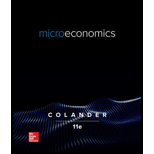
MICROECONOMICS (LL)-W/ACCESS >CUSTOM<
11th Edition
ISBN: 9781264207718
Author: Colander
Publisher: MCG CUSTOM
expand_more
expand_more
format_list_bulleted
Question
Chapter 2, Problem 5IP
To determine
Impact on
Expert Solution & Answer
Want to see the full answer?
Check out a sample textbook solution
Students have asked these similar questions
Explain and evaluate the impact of legislation on the U.S. criminal justice system, specifically on the prison population and its impact on poverty and the U.S. economy. Include significant elements and limitations such as the War on Drugs and the First Step Act.
Given the following petroleum tax details, calculate the marginal tax rate and explain
its significance:
Total Revenue: $500 million
Cost of Operations: $200 million
Tax Rate: 40%
Additional Royalty: 5%
Profit-Based Tax: 10%
Use a game tree to illustrate why an aircraft manufacturer may price below the current marginal cost in the short run if it has a steep learning curve.
(Hint:
Show that learning by doing lowers its cost in the second period.)
Part 2
Assume for simplicity the game tree is illustrated in the figure to the right. Pricing below marginal cost reduces profits but gives the incumbent a cost advantage over potential rivals. What is the subgame perfect Nash equilibrium?
Chapter 2 Solutions
MICROECONOMICS (LL)-W/ACCESS >CUSTOM<
Ch. 2.1 - Prob. 1QCh. 2.1 - Prob. 2QCh. 2.1 - Prob. 3QCh. 2.1 - Prob. 4QCh. 2.1 - Prob. 5QCh. 2.1 - Prob. 6QCh. 2.1 - Prob. 7QCh. 2.1 - Prob. 8QCh. 2.1 - Prob. 9QCh. 2.1 - Prob. 10Q
Ch. 2.A - Prob. 1QECh. 2.A - Prob. 2QECh. 2.A - Prob. 3QECh. 2.A - Prob. 4QECh. 2.A - Prob. 5QECh. 2.A - Prob. 6QECh. 2.A - Prob. 7QECh. 2.A - Prob. 8QECh. 2 - Prob. 1QECh. 2 - Prob. 2QECh. 2 - Prob. 3QECh. 2 - Prob. 4QECh. 2 - Prob. 5QECh. 2 - Prob. 6QECh. 2 - Prob. 7QECh. 2 - Prob. 8QECh. 2 - Prob. 9QECh. 2 - Prob. 10QECh. 2 - Prob. 11QECh. 2 - Prob. 12QECh. 2 - Prob. 1QAPCh. 2 - Prob. 2QAPCh. 2 - Prob. 3QAPCh. 2 - Prob. 4QAPCh. 2 - Prob. 5QAPCh. 2 - Prob. 1IPCh. 2 - Prob. 2IPCh. 2 - Prob. 3IPCh. 2 - Prob. 4IPCh. 2 - Prob. 5IPCh. 2 - Prob. 6IP
Knowledge Booster
Similar questions
- Answerarrow_forwardM” method Given the following model, solve by the method of “M”. (see image)arrow_forwardAs indicated in the attached image, U.S. earnings for high- and low-skill workers as measured by educational attainment began diverging in the 1980s. The remaining questions in this problem set use the model for the labor market developed in class to walk through potential explanations for this trend. 1. Assume that there are just two types of workers, low- and high-skill. As a result, there are two labor markets: supply and demand for low-skill workers and supply and demand for high-skill workers. Using two carefully drawn labor-market figures, show that an increase in the demand for high skill workers can explain an increase in the relative wage of high-skill workers. 2. Using the same assumptions as in the previous question, use two carefully drawn labor-market figures to show that an increase in the supply of low-skill workers can explain an increase in the relative wage of high-skill workers.arrow_forward
- Published in 1980, the book Free to Choose discusses how economists Milton Friedman and Rose Friedman proposed a one-sided view of the benefits of a voucher system. However, there are other economists who disagree about the potential effects of a voucher system.arrow_forwardThe following diagram illustrates the demand and marginal revenue curves facing a monopoly in an industry with no economies or diseconomies of scale. In the short and long run, MC = ATC. a. Calculate the values of profit, consumer surplus, and deadweight loss, and illustrate these on the graph. b. Repeat the calculations in part a, but now assume the monopoly is able to practice perfect price discrimination.arrow_forwardThe projects under the 'Build, Build, Build' program: how these projects improve connectivity and ease of doing business in the Philippines?arrow_forward
arrow_back_ios
SEE MORE QUESTIONS
arrow_forward_ios
Recommended textbooks for you
 Microeconomics: Private and Public Choice (MindTa...EconomicsISBN:9781305506893Author:James D. Gwartney, Richard L. Stroup, Russell S. Sobel, David A. MacphersonPublisher:Cengage Learning
Microeconomics: Private and Public Choice (MindTa...EconomicsISBN:9781305506893Author:James D. Gwartney, Richard L. Stroup, Russell S. Sobel, David A. MacphersonPublisher:Cengage Learning Macroeconomics: Private and Public Choice (MindTa...EconomicsISBN:9781305506756Author:James D. Gwartney, Richard L. Stroup, Russell S. Sobel, David A. MacphersonPublisher:Cengage Learning
Macroeconomics: Private and Public Choice (MindTa...EconomicsISBN:9781305506756Author:James D. Gwartney, Richard L. Stroup, Russell S. Sobel, David A. MacphersonPublisher:Cengage Learning Economics: Private and Public Choice (MindTap Cou...EconomicsISBN:9781305506725Author:James D. Gwartney, Richard L. Stroup, Russell S. Sobel, David A. MacphersonPublisher:Cengage Learning
Economics: Private and Public Choice (MindTap Cou...EconomicsISBN:9781305506725Author:James D. Gwartney, Richard L. Stroup, Russell S. Sobel, David A. MacphersonPublisher:Cengage Learning



Microeconomics: Private and Public Choice (MindTa...
Economics
ISBN:9781305506893
Author:James D. Gwartney, Richard L. Stroup, Russell S. Sobel, David A. Macpherson
Publisher:Cengage Learning

Macroeconomics: Private and Public Choice (MindTa...
Economics
ISBN:9781305506756
Author:James D. Gwartney, Richard L. Stroup, Russell S. Sobel, David A. Macpherson
Publisher:Cengage Learning

Economics: Private and Public Choice (MindTap Cou...
Economics
ISBN:9781305506725
Author:James D. Gwartney, Richard L. Stroup, Russell S. Sobel, David A. Macpherson
Publisher:Cengage Learning


